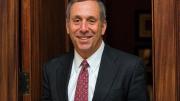Just as I was sitting down to write this column before the Thanksgiving break, amidst grim reports of a rapidly spreading virus, welcome news about the work of a recent graduate crossed my desk. TIME had named Upsolve—a nonprofit co-founded by Rohan Pavuluri, Harvard College Class of 2018—one of the “best inventions of 2020.” The aim of the free service, one of three apps acknowledged in this year’s finance category, is to reduce complexity and remove barriers to filing for Chapter 7 bankruptcy. The technology and the team behind it have made basic civil legal aid more accessible to low-income families. In the process, they have helped relieve more than $285 million in debt, giving people across the country an opportunity to reset their lives financially.
What role did the University play in making this innovation possible? The idea came to Pavuluri as a sophomore while he was working in the Access to Justice Lab at Harvard Law School. After following a winding development path, he found himself at the Harvard Innovation Lab (i-lab) in Allston, where the venture came to life. At the i-lab, Pavuluri refined and perfected his idea. Upsolve entered the President’s Innovation Challenge in 2017 and captured the $75,000 grand prize in the Social Impact or Cultural Enterprise category. With increased visibility and viability, Upsolve went on to secure funding from the Legal Services Corporation, as well as charitable foundations and individual donors.
The i-lab is in its infancy compared to much of the University. When it opened its doors in 2011, the idea was to bring people together in ways that might transform moments of inspiration and ingenuity into something more concrete. Today, one-third of Harvard College undergraduates spend time at the i-lab during their four years on campus. Over the past nine years—thanks, in part, to generous funding from the Bertarelli Foundation—the President’s Innovation Challenge has supported more than eighty student ventures. Some $2.8 million in grants have helped prize winners leverage more than $340 million in external funding. Following the success of the i-lab, new programs and resources, including the Pagliuca Harvard Life Lab, Launch Lab X accelerator, and ArtLab, have joined this entrepreneurial ecosystem and expanded the University’s ability to support innovation of all kinds.
The addition of an innovation lab on Western Avenue a decade ago gave the members of our community an opportunity to come together and create something truly extraordinary—an aspiration that continues to fuel our work in Allston. As you read this, the Harvard John A. Paulson School of Engineering and Applied Sciences (SEAS) is beginning to move approximately half of its faculty and staff to our new Science and Engineering Complex. The 500,000-square-foot teaching and research facility, which includes a café, common space, a library, and a maker space, is a gorgeous addition to our campus and a masterwork in sustainable architecture. It will eventually be home to applied computation, bioengineering, computer science, and robotics, as well as some of electrical engineering, materials science, and mechanical engineering.
Bringing the energy and imagination of SEAS to Allston will have profound effects on the University and no doubt spark innovations and collaborations that will change how we live and work, how we understand and navigate the world. Science and engineering—and the technology they generate—play an enormous and, it seems, ever-growing role in each of our lives and across fields and disciplines. If Harvard hopes to have the same influence on the future as it has had since 1636, we must continue making space for something new. When humanity has the pandemic in its rearview mirror, our best years—our best inventions—will be ahead of us.









